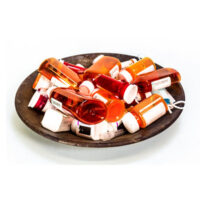Disposing Of A Loved One’s Medication After They Pass

Right after a loved one passes away, there are a wide variety of things you, as a guardian, must do. And, one of those things is, quite simply, to dispose of the medication in their possession.
To properly dispose of the medication once in your loved one’s possession, there is a process you must follow. By being aware of this process, and why it’s important, disposing of this medication is much easier.
Are Guardians Allowed To Dispose Of A Deceased Loved One’s Medication?
The simple answer to this question is “Yes.” And, the reasons for this, as well as the importance of proper medication disposal, is outlined in the “Secure and Responsible Drug Disposal Act of 2010.”
A legal possessor – you, for example, as a guardian – has the ability to dispose of the medication that their loved one once possessed. The purpose of this is to ensure that individuals who might abuse these drugs no longer have access to them.
Outside of the disposal of medication, this act allows legal possessors to dispose of controlled substances, of any schedule, that their deceased loved one once legally acquired and possessed.
How Can A Guardian Dispose Of A Deceased Loved One’s Medication?
The process of disposing of a deceased loved one’s medication is often quite easy. But, some complexities can arise and, if there is any confusion or uncertainty, it is best to speak with a guardianship attorney.
Step 01: Determine What Disposal Options Are Available
Many cities offer drug take-back programs. The purpose of these programs is to take back drugs that can no longer be used or, in other cases, will no longer be used for a specific reason.
To determine whether or not this is the case, you can visit the Drug Enforcement Agency’s website. Or, alternatively, you can go to your local pharmacy and ask if they offer any drug take-back programs or know of one near you.
Step 02: Go Through The FDA’s Flush List
The Food and Drug Administration, of the United States, has a special list called the “flush list.” Right before you go to a drug take-back program, you should read through the FDA’s flush list.
A medication may be on the FDA’s flush list for one of the following reasons:
- The medication possesses significant potential for abuse.
- The medication can cause serious illness and/or death, from just one dose, if used improperly.
When a medication is on the FDA’s flush list, that means it should be flushed down, into the toilet, as soon as possible. Throwing it into the trash is unwise, although some drug take-back programs may accept them.
Step 03: Toss The Remaining Medications Into The Trash
Some guardians may find that the medications that their deceased loved one once possessed are not, in fact, on the FDA’s flush. But, they may also find that there is no drug take-back program near them.
When this is the case, you should simply throw those medications into the trash. Doing so is considered the best possible legal act and it will ensure that those medications are disposed of.
Speak With A Florida Guardianship Attorney Today
Your responsibilities, as a guardian, can be complex and confusing. Speaking with a Florida guardianship attorney at the Millhorn Elder Law Planning Group today will allow you to better understand your responsibilities and what to do in certain situations.
Sources:
congress.gov/111/plaws/publ273/PLAW-111publ273.pdf
law.cornell.edu/wex/controlled_substance
dea.gov/takebackday
fda.gov/drugs/disposal-unused-medicines-what-you-should-know/drug-disposal-fdas-flush-list-certain-medicines


